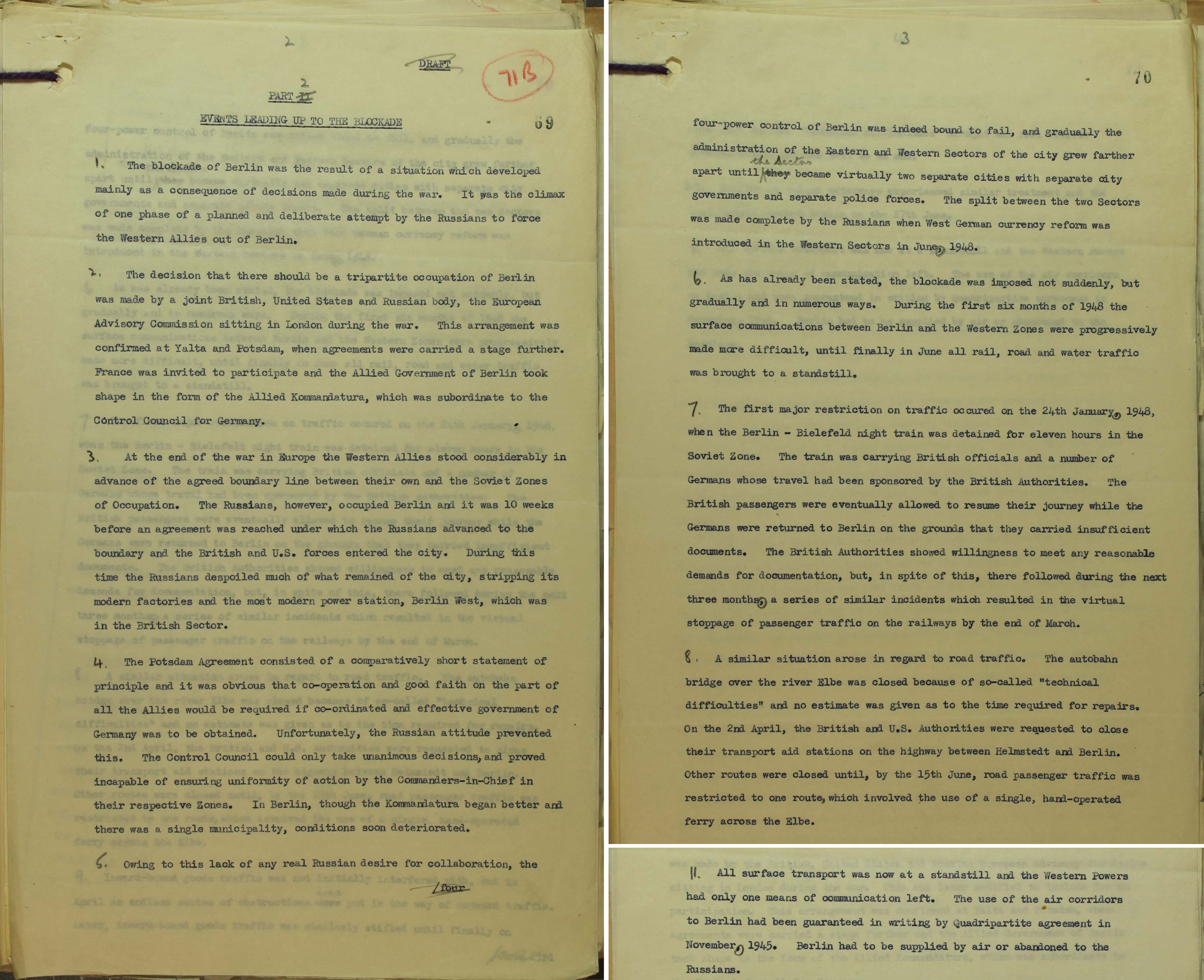
Extract from a Report by the British Air Ministry on the Berlin Blockade, published in 1950. (Catalogue ref: AIR 55/111)
Transcript
- The blockade of Berlin was the result of a situation which developed mainly as a consequence of decisions made during the war. It was the climax of one phase of a planned and deliberate attempt by the Russians to force the Western allies out of Berlin.
- The decision that there should be a tri-partite occupation of Berlin was made by a joint British, United States and Russian body, the European Advisory Commission sitting in London during the war. This arrangement was confirmed at Yalta and Potsdam, when agreements were carried a stage further. France was invited to participate and the Allied Government of Berlin took shape in the form of the Allied Kommandatura, which was subordinate to the Control Council for Germany.
- At the end of the war in Europe the Western Allies stood considerably in advance of the agreed boundary line between their own and the Soviet Zones of Occupation. The Russians, however, occupied Berlin and it was 10 weeks before an agreement was reached under which the Russians advanced to the boundary and the British and U.S. forces entered the city. During this time the Russians despoiled much of what remained of the city, stripping its modern factories and the most modern power station, Berlin West, which was in the British sector.
- The Potsdam Agreement consisted of a comparatively short statement of principle and was not a statute book for the government of Germany. Consequently, co-operation and good faith on the part of the allies was required in co-ordinated and effective government of Berlin was to be obtained. Unfortunately, the Russian attitude prevented this. The Control Council could only take unanimous decisions, and proved incapable of ensuring uniformity of action by the Commanders-in-Chief in their respective Zones. In Berlin, though the Kommandatura began better and there was a single municipality, conditions soon deteriorated.
- Owing to this lack of collaboration, the four power control of Berlin was bound to fail and gradually the administration of the Eastern and Western sectors of the city grew farther apart until the sectors became virtually two separate cities with separate city governments and separate police forces. The split between the two sectors was made complete by the Russians when West German currency reform was introduced in the Western Sectors in June 1948.
- As has already been stated the blockade was imposed not suddenly, but gradually and in numerous ways. During the first six months of 1948 the surface communications between Berlin and the Western Zones were progressively made more difficult, until finally in June all rail, road and water traffic was brought to standstill.
- The first major restriction on traffic occurred on the 24th January, 1948, when Berlin-Bielefeld night train was detained for eleven hours in the Soviet Zone. The train was carrying British officials and a number of Germans whose travel had been sponsored by the British authorities. The British passengers were eventually allowed to resume their journey while the Germans were returned to Berlin on the grounds that they carried insufficient documents. The British Authorities showed willingness to meet any reasonable demand for documentation, but, in spite of this, there followed during the next three months, a series of similar incidents which resulted in the virtual stoppage of passenger traffic on the railways by the end of March.
- A similar situation arose in regard to road traffic. The autobahn bridge over the river Elbe was closed because of so called “technical difficulties” and no estimate was given as to the time required for repairs. On the 2nd April, the British and U.S. Authorities were requested to close their transport aid stations on the highway between Helmstedt and Berlin. Other routes were closed until, by the 15th June, road passenger traffic was restricted to one route, which involved the use of a single, hand-operated ferry across the Elbe.
….
- All surface transport was now at a standstill and the Western Powers had only one means of communication left. The use of the air corridors to Berlin had been guaranteed in writing by Quadri-partite agreement in November, 1945. Berlin had to be supplied by air or abandoned to the Russians.
